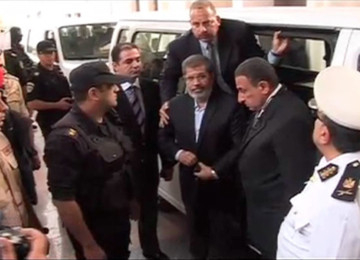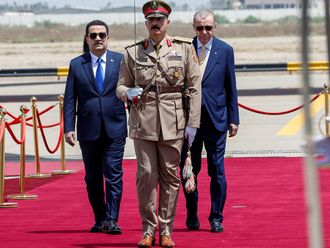
Cairo: Egypt’s ousted Islamist president Mohammad Mursi has been moved from a prison hospital to a cell where he is kept on his own, said the Interior Ministry.
The move came 10 days after Mursi had been put under medical observation at the hospital of the maximum-security prison near the coastal city of Alexandria, according to a senior security official.
“His transfer is according to the law after he was found to be in good health,” said Gen. Ahmad Helmi, an assistant to the interior minister. He added that the prison authorities were careful to put Mursi in a cell of his own where he is isolated from other detained members of his Muslim Brotherhood and criminal inmates.
Mursi faces charges of inciting the murder of protesters in December while in office. At the first hearing of the trial held at a makeshift courtroom near Cairo on November 4, Mursi appeared defiant, repeatedly telling the court: “I am the legitimate president of the republic.”
In July, the army deposed Mursi, Egypt’s first democratically elected president, after millions of Egyptians took to the streets demanding end to his one-year-old rule.
During his transfer to the cell on Thursday, Mursi lost his temper and vowed to return to power and “purge” the Interior Ministry, which is in charge of prisons in Egypt, the independent newspaper Al Masry Al Youm reported, citing prison sources. “Mursi shouted at the officer, saying: ‘I’m the legitimate president of the country. I’ll come back and purge the Interior Ministry of traitors and the corrupt,’” said the paper.
Mursi’s cell has a bathroom and is equipped with a bed, a small fridge and a TV set, added the sources.
His transfer came a day after he warned in a statement, attributed to him by a visiting lawyer, that stability would not be re-established in Egypt without eliminating what he called the “military coup”.
In the statement, he also accused the military of “forcibly kidnapping” him on July 2 and keeping him incommunicado until his showing at the trial.
Mursi’s son Osama, a lawyer who visited him along with other four lawyers, said that the prison authorities had refused to allow his mother to visit the Islamist leader. “The prison administration cancelled the visit in response to the statement addressed by my father to the [Egyptian] people via lawyer Mohammad Al Damati,” Osama posted on Facebook.
Fourteen other Islamists, including senior Brotherhood officials, stand along Mursi the trial, which is due to resume on January 8.
Army and police increased security across the nation on Friday, a day after a three-month state of emergency ended. Armoured vehicles were positioned in Cairo’s Tahrir Square, which was also blocked by barbed wires to bar the Brotherhood’s followers from protesting there.
Security forces were also seen outside key state institutions and public squares in anticipation of anti-military rallies. Mursi’s loyalists have vowed to continue protests until he is reinstated.
Interim President Adly Mansour declared the state of emergency, including a nightime curfew, in Mid-August, following a deadly security crackdown on two mass protests held by Mursi’s backers in Cairo. More than 1,000 people have been killed in Egypt’s violence since Mursi’s overthrow.











